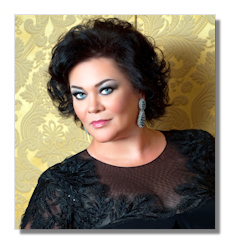
The Internet's Premier Classical Music Source
Related Links
- Latest Reviews
- More Reviews
-
By Composer
-
Collections
DVD & Blu-ray
Books
Concert Reviews
Articles/Interviews
Software
Audio
Search Amazon
Recommended Links
Site News
 Concert Review
Concert Review
Tod und Verklärung

- Mikolajus Konstantinas Čiurlionis: In the Forest
- Richard Wagner:
- Wesendonck Lieder
- Der Männer Sippe from Die Walküre, Act 1
- Prelude and Liebestod from Tristan and Isolde
- Richard Strauss: Tod und Verklärung
Violeta Urmana, soprano
Lithuanian National Symphony Orchestra/Modestas Pitrėnas
Centre for Fine Arts, Brussels, 12 September 2013
Tod und Verklärung or Death and Transfiguration might not be the most alluring title of introduction, but this concert programmed by the International Brussels Music Festival, the "KlaraFestival", was a calling card for Lithuania, the Baltic state that holds this half year the Presidency of the European Union Council. The major Lithuanian orchestra, the National Symphony founded in 1940, accompanied under its Assistant conductor Modestas Pitrėnas, the Lithuanian diva Violeta Urmana in a program of mainly German music, wherein the notions of melancholia and death made several appearances. Nevertheless it was a festive occasion, not only attended by the President of the Lithuanian Republic, Dalia Grybauskaitė, and the Belgian King, but also by a large group of patrons clearly unfamiliar with concert hall etiquette – judging by the more than frequent smartphone interruptions and the eager clapping almost on top of the dying chords.
It was good to hear a bit of Lithuanian music too. Mikolajus Konstantinas Čiurlionis (1875-1911) isn't particularly over-represented in the concert halls and the inclusion of his symphonic poem In the Forest from 1900/1 was a welcome introduction. Composer and painter Čiurlionis is now considered one of the most significant artists in his country, a national hero – although fame only came after his untimely death – whose remarkable output (some 400 compositions) contributed to the establishment of composing as a serious profession. While falling short of being a real revelation, his poem for large orchestra In the Forest, is an agreeable late romantic work, echoing Wagner but also Scriabin – melodious, evocative, and skillfully orchestrated. It was brought with great conviction by the orchestra, remarkable for its rich sonority.
Violeta Urmana was quite normally showcased as the star of the event, with three appearances during the evening. Obviously a consummate performer with a strong presence, nonetheless on this occasion Urmana was eclipsed by the National Symphony Orchestra. Her rendition of the Wesendonck songs remained rather monochromatic and riddled with vibrato. It was the orchestra under the alert guidance of Pitrėnas that provided most color and temperament. Urmana's voice didn't strike as particularly powerful either, as became apparent in the more elaborately orchestrated opera fragments. Her vibrato was even more prominent and the high notes in Der Manner Sippe from Die Walküre and Mild und leise from Tristan sounded strained and pressed, compromising the dramatic credibility of these moments.
The brilliant sonority of the Lithuanian National Symphony Orchestra was demonstrated best of all by an outstanding traversal of Strauss' Tod und Verklärung. Pitrėnas' approach secured an excellent transparency and balance. By taking great care of the many dynamic shadings, the luxurious textures rang beautifully ecstatic in the climactic passages, without a hint of harshness or bad taste, highlighting the strength of the different sections – warm strings, characterful woodwinds, notably a superb first oboe, biting brass and powerful timpani. The closing pages really seem to transport you into a different reality. The occasional flaws in ensemble were easily forgotten by the quality of the whole and in the end mattered less than the relative disappointment of Urmana's performance.
Copyright © 2013, Marc Haegeman












